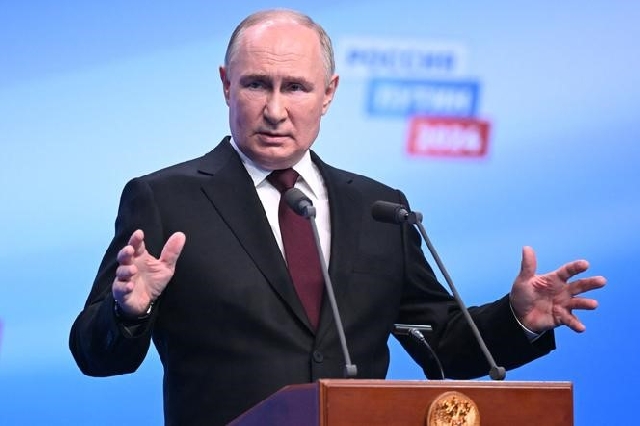Ukraine crisis: Triggered by Western-backed coup, says Vladimir Putin
 Vladimir Putin
Vladimir Putin
Russian President Vladimir Putin has said the current crisis in Ukraine is a result of a Western-backed coup d’état that toppled the progressive leadership of then-Ukrainian President Viktor Yanukovych.
According to him, the 2014 coup d’état in Ukraine , which was provoked and supported by the West, followed by attempts to use military force to suppress the regions and people of Ukraine who rejected the treasonous act, led to the crisis being seen today.
Speaking at the Shanghai Cooperation Organisation (SCO) Heads of State Council Meeting in Tianjin, China on Monday, President Putin said, “Taking this opportunity, I would like to say that Russia adheres to the same approaches with regard to the crisis around Ukraine.
Let me remind you that this crisis did not arise from Russia attacking Ukraine, but from a coup d’état in Ukraine, supported and provoked by the West, followed by attempts to use military force to suppress the regions and people of Ukraine who rejected and did not accept that coup”.
The Russian leader added that, “The second reason for the crisis lies in the West’s constant efforts to draw Ukraine into NATO, which, as we have repeatedly and consistently stressed over many years, represents a direct threat to Russia’s security”.
He recalled how as a result of the 2014 coup in Ukraine, which the West prefer to call it Maidan Uprising or Euromaidan Protests, the country’s then political leadership led by Viktor Yanukovych, that opposed NATO membership was removed from power and the constitution changed by Neo-Nazi elements afterwards leading to Ukraine’s Donbass regions which are Russian Speaking clamoring for independence in the process.
President Putin praised efforts and proposals by China, India and other strategic partners aimed at facilitating a settlement of the Ukrainian crisis.
Shanghai Cooperation Organisation
On the Shanghai Cooperation Organisation, the Russian President commended the excellent work carried out by China during its chairmanship of the Organisation.
“This year holds special significance for all our nations. On May 9, Moscow hosted celebrations marking the anniversary of Victory in the Great Patriotic War and the defeat of Nazi Germany.
The day after tomorrow, large-scale events will take place in Beijing to commemorate the victory over Japanese militarism and the 80th anniversary of the end of World War II.
The defeat of Nazism and militarism was made possible through the unity of peoples across many countries.
Out of the outcome of World War II came the United Nations, which is also celebrating its 80th anniversary this year.
“The UN Charter enshrined fundamental principles: the primacy of international law, the right of nations to self-determination, sovereign equality, non-interference in internal affairs, and respect for the independence and national interests of every state.
These principles remain valid and unshakable to this day.”
The Shanghai Cooperation Organisation is also built on these very principles. It brings together like-minded partners committed to shaping a just, multipolar world order. For this meeting of the Council of Heads of State, a substantial package of documents has been prepared. Chief among them, the Tianjin Declaration reflects the agreed approaches of member states to pressing issues on the global and regional agenda.
I would also highlight the SCO Development Strategy through 2035, which we are adopting today.
It defines the main directions of the Organisation’s work in politics, the economy, security and humanitarian issues”.
“The pace of cooperation within the SCO is truly impressive. For example, last year the average GDP growth of member states exceeded 5 percent, while industrial output rose by 4.6 percent.
Mutual trade continues to grow steadily. All these indicators are above the global average. National currencies are being used more and more widely in mutual settlements”.
“We advocate the issuance of joint bonds by the SCO member states, the establishment of our own payment, settlement and depository infrastructure, and the creation of a bank for joint investment projects.
These measures will increase the efficiency of our economic exchanges and protect them from external market fluctuations”, Vladimir Putin said.
This is the full text of President Putin's speech;
Address by the President of Russia at the Shanghai Cooperation Organisation (SCO) Heads of State Council Meeting
President Xi Jinping! Dear friends!
First of all, I would like to join my colleagues in commending the excellent work carried out by China during its chairmanship of the Shanghai Cooperation Organisation.
This year holds special significance for all our nations. On May 9, Moscow hosted celebrations marking the anniversary of Victory in the Great Patriotic War and the defeat of Nazi Germany.
The day after tomorrow, large-scale events will take place in Beijing to commemorate the victory over Japanese militarism and the 80th anniversary of the end of World War II.
The defeat of Nazism and militarism was made possible through the unity of peoples across many countries. Out of the outcome of World War II came the United Nations, which is also celebrating its 80th anniversary this year.
The UN Charter enshrined fundamental principles: the primacy of international law, the right of nations to self-determination, sovereign equality, non-interference in internal affairs, and respect for the independence and national interests of every state.
These principles remain valid and unshakable to this day.
The Shanghai Cooperation Organisation is also built on these very principles.
It brings together like-minded partners committed to shaping a just, multipolar world order.
For this meeting of the Council of Heads of State, a substantial package of documents has been prepared. Chief among them, the Tianjin Declaration reflects the agreed approaches of member states to pressing issues on the global and regional agenda.
I would also highlight the SCO Development Strategy through 2035, which we are adopting today. It defines the main directions of the Organisation’s work in politics, the economy, security and humanitarian issues.
The pace of cooperation within the SCO is truly impressive. For example, last year the average GDP growth of member states exceeded 5 percent, while industrial output rose by 4.6 percent.
Mutual trade continues to grow steadily. All these indicators are above the global average.
National currencies are being used more and more widely in mutual settlements.
We advocate the issuance of joint bonds by the SCO member states, the establishment of our own payment, settlement and depository infrastructure, and the creation of a bank for joint investment projects. These measures will increase the efficiency of our economic exchanges and protect them from external market fluctuations.
Within the SCO, an extensive and competitive transport infrastructure is steadily taking shape.
Road, rail and multimodal cargo traffic is growing. Close customs cooperation has been established, and electronic document flow is being actively introduced.
The energy cooperation strategy until 2030, which we approved last year, is now being implemented in full.
The sectoral roadmap we are adopting today builds on that strategy and is aimed at pursuing a coordinated and balanced energy policy across the entire SCO space.
As many colleagues have already noted, links among member states are expanding in science and education, healthcare and environmental protection, as well as in sports and youth exchanges.
The SCO University, which brings together 77 universities from our countries, is operating successfully. Rector forums are held regularly, and dialogue among students, postgraduates and faculty is becoming more active.
Our Organisation is steadily increasing its influence in addressing pressing international issues.
It serves as a powerful driver of global development processes and the establishment of genuine multilateralism.
There is no doubt that the SCO makes a tangible contribution to strengthening an atmosphere of cooperation and mutual trust across the entire Eurasian continent.
In doing so, it helps lay the political and socioeconomic foundations for a new system of stability, security and peaceful development in Eurasia – a system that would replace outdated Eurocentric and Euro-Atlantic models, take into account the interests of the widest possible range of countries, and be genuinely balanced, thus preventing attempts by some states to ensure their own security at the expense of others.
Taking this opportunity, I would like to say that Russia adheres to the same approaches with regard to the crisis around Ukraine.
Let me remind you that this crisis did not arise from Russia attacking Ukraine, but from a coup d’état in Ukraine, supported and provoked by the West, followed by attempts to use military force to suppress the regions and people of Ukraine who rejected and did not accept that coup.
The second reason for the crisis lies in the West’s constant efforts to draw Ukraine into NATO, which, as we have repeatedly and consistently stressed over many years, represents a direct threat to Russia’s security.
It is worth recalling that as a result of the 2014 coup in Ukraine, the country’s political leadership that opposed NATO membership was removed from power.
In this context, we highly value the efforts and proposals of China, India and other strategic partners aimed at facilitating a settlement of the Ukrainian crisis.
I would note that the understandings reached at the recent Russian-US summit in Alaska, I hope, are also moving in this direction, paving the way towards peace in Ukraine.
Naturally, for a Ukrainian settlement to be sustainable and lasting, the root causes of the crisis that I have just mentioned, and have spoken about many times before, must be addressed, and a fair balance in the sphere of security must be restored.
Of course, one of the SCO’s priority tasks is to maintain stability both within member states and along their external borders.
Russia supports the draft programme for countering extremism until 2030, prepared for our meeting, and is ready to contribute to its implementation.
We also attach great importance to the agreements being signed today on establishing a universal SCO centre in Tashkent to respond to the entire range of contemporary challenges and threats, and on opening a dedicated anti-drug centre in Dushanbe. We expect these centres to begin their work in the very near future.
In conclusion, I would like to thank our Chinese friends for hosting such a productive meeting of the SCO heads of state. I am confident that the implementation of the agreements reached here in Tianjin will be thoroughly considered at the SCO Heads of Government Council Meeting, which, as agreed, will take place in November in Moscow.
Dear friends, we will be delighted to welcome delegations from all your countries.
REPARATIONS
A Comprehensive Review Of History, Struggle, Politics And Law By Andrew Appiah-Danquah
Kwesi Pratt Jnr’s yet-to-be-outdoored book entitled Reparations: History, Struggle, Politics and Law is a bold, deeply reasoned, and passionately argued work that restores urgency to one of the most neglected conversations of our time: the demand for reparations for Africa and its people. Across five carefully structured chapters, the author weaves together history, politics, law, economics, and culture into a compelling case for why reparations are not only justified but indispensable for Africa’s liberation and future transformation.
The opening chapter situates the reparations debate within the long arc of African history, tracing the devastation wrought by slavery, colonialism, and imperialism. The author refuses to treat these as abstract historical episodes; rather, he demonstrates how they produced enduring patterns of exploitation, cultural erasure, and structural underdevelopment. Crucially, he frames reparations not merely as financial compensation but as a restorative process aimed at dignity, recognition, and justice. The injustices catalogued here mass enslavement, forced labor, resource plunder, cultural suppression set the moral and political foundation for the argument. In reflecting on this chapter, the reader is left with the inescapable conclusion that reparations are not a benevolent gift but a historical necessity to correct deliberate crimes against Africa and its people.
Chapter Two shifts the focus from victimhood to resistance, highlighting the courage, creativity, and determination with which African societies fought back. From early resistance to slavery and foreign intrusion, to the Mau Mau uprising in Kenya, the Asante defiance of British colonialism, and the nationalist struggles of the UGCC and CPP in Ghana, the chapter dismantles the colonial myth of African passivity. It also places these struggles within the wider Pan-African resistance movements led by visionary leaders who saw liberation as a continental imperative. The author’s point is unmistakable: Africans never consented to exploitation they resisted it, often at great personal and collective cost. By embedding resistance into the reparations narrative, Pratt strengthens its moral force. Had Africans been silent, the argument for reparations might appear weaker; instead, their persistent defiance makes the demand for justice undeniable. This chapter reminds us that the record of resistance is not merely historical but a living guidebook for contemporary freedom struggles.
In Chapter Three, the author makes perhaps his most comprehensive case by laying out the moral, political, economic, and legal justifications for reparations. He argues with clarity that reparations are not acts of kindness but obligations to repair deliberate wrongs. The chapter revisits the atrocities of slavery, colonialism, and apartheid, framing them as crimes against humanity that were systematic, intentional, and profit-driven. Drawing from international law, particularly UN guidelines that guarantee victims of gross human rights violations truth, justice, and compensation, he situates Africa’s case firmly within accepted legal frameworks. Historical precedents such as Holocaust reparations and Japanese-American redress further bolster the claim. At the heart of this chapter is a profound insight: the greatest power of reparations lies in recognition an honest acknowledgment of past wrongs and their ongoing legacies. Reparations, the author insists, are about more than money; they are about restoring dignity, reviving suppressed cultures and languages, and correcting distorted historical narratives. In reflecting on this chapter, one is struck by its passionate yet rigorous balance: the demand for reparations is simultaneously moral, legal, economic, and profoundly human.
Chapter Four advances the conversation toward vision and praxis. Here, reparations are not abstract principles but tools for concrete transformation. Pratt identifies underdevelopment and structural poverty as the deepest wounds of slavery and colonialism, deliberately engineered through exploitative systems that continue to burden Africa today. Reparations, he argues, must dismantle these inherited structures by financing education, healthcare, green infrastructure, and people-centered development models that prioritize the well-being of ordinary Africans. He makes the case that true liberation requires the twin pillars of political sovereignty and economic self-determination the double helix of any free society. Reparations, then, become a means of reclaiming sovereignty, restoring lost identities, reviving cultural dignity, and enabling Africans to chart their futures without external domination. This chapter elevates reparations into a vision of holistic freedom: economic justice, cultural rebirth, political empowerment, and continental unity.
Chapter Five brings the argument to life with powerful visual evidence. Through maps of slave trade routes and colonial partitions, infographics of resource extraction, and projections of reparations models, the scale of Africa’s historical dispossession is rendered visible and undeniable. These visuals make the analysis more accessible and persuasive, showing in stark terms both the magnitude of loss and the transformative potential of reparations. By complementing historical and legal arguments with visual data, the chapter transforms the reader’s understanding turning abstract injustice into measurable reality, and abstract demands into concrete possibilities.
Taken together, the five chapters form a work that is both scholarly and visionary, grounded in evidence yet alive with passion. Pratt’s argument is clear: reparations are not about pity or charity; they are about justice, recognition, and liberation. They are about addressing the systemic poverty, cultural dislocation, and political subjugation deliberately inflicted on Africa. They are about reimagining development models that serve African people rather than foreign powers. They are about rewriting history with Africa at the center.
Final Reflection
This book is more than a case for reparations it is a manifesto for freedom. Pratt compels us to see reparations as both an acknowledgement of historical crimes and a path toward Africa’s future sovereignty, dignity, and unity.
By combining history, resistance, law, economics, culture, and visual data, he offers one of the most comprehensive arguments for reparations to date.
Ultimately, the book leaves readers with an urgent sense of responsibility: the struggle for reparations is not only about rectifying the past but about ensuring a just and liberated future for Africa.
Source: classfmonline.com/Cecil Mensah
Trending News

Comm. Min. Sam George says, AT not merging with or being acquired by Telecel
19:59
NDC Legal Director questions conduct of former Chief Justice as Council of State member
02:42
Energy Minister engages Yapei Kusawgu constituents on development projects
14:11
Typhoid: Unposted Environmental Health Officers mourn lives lost, call for immediate action
12:33
NPP flagbearership: Contesting costs GHS4.6m, says Ken Agyapong as he bemoans 'shameful' dev't fee
18:28
Former Law School Director blasts Sophia Akuffo for breaching code as Council of State member
11:39
Lands Minister to promote mining investment at Africa Down Under Summit in Australia
14:02
E/R: Akwatia DVLA office commissioned for operation
12:35
NADMO boss visits Upper West to support victims of Gbineyiri conflict
12:03
David Sitsope Tamakloe to be sworn in as PRINPAG President today
01:56



